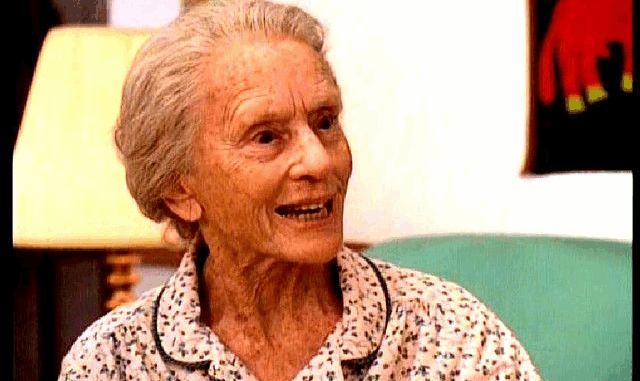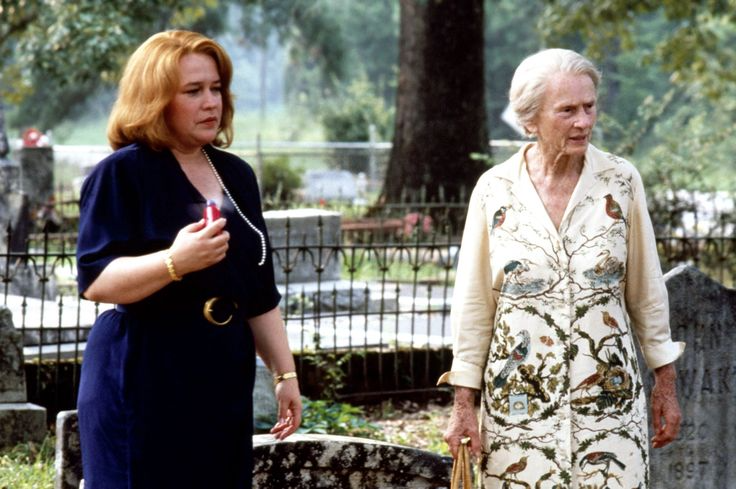
The Gentle Voice That Echoed Across Generations
In Fried Green Tomatoes, the emotional heartbeat of the film doesn’t come from a grand speech or a dramatic confrontation. It comes from a quiet, elderly woman sitting in a nursing home, spinning tales from a long-forgotten town. Ninny Threadgoode, portrayed with warmth and depth by Jessica Tandy, is one of the most layered and mysterious characters in the film. Her power lies not in what she does physically, but in how her stories revive the past, reshape the present, and inspire transformation.
She may seem like a side character—just a sweet old woman telling stories—but as the film unfolds, it becomes clear that Ninny is the narrative bridge between two women, two timelines, and two kinds of courage.
A Woman from Nowhere, with a Past That Feels Like Home
When we first meet Ninny, she’s living in a nursing home, seemingly overlooked and cast aside like many elderly people in society. But she doesn’t carry bitterness. She carries stories.
Evelyn, struggling with middle-age dissatisfaction and a stale marriage, meets Ninny during routine visits to see her husband’s aunt. Evelyn is not expecting wisdom or friendship—until she sits down and listens.
Ninny begins recounting tales of Whistle Stop, a small Alabama town in the 1920s and 30s. At first, the stories seem anecdotal. But they quickly reveal emotional depth, thematic richness, and a cast of characters that Evelyn—and the audience—begin to love.
The Storyteller Who Builds a World
Ninny is not just telling tales. She’s painting a world. She speaks of Idgie Threadgoode, the rebellious tomboy. Of Ruth, her gentle companion. Of Sipsey and Big George. Of café meals and love in disguise. Her voice is soft, but what she’s really doing is building a bridge between decades, reminding Evelyn—and all of us—that the past holds wisdom, courage, and purpose.
Her stories are layered with symbolism and honesty. They don’t romanticize the past; they expose its harshness, racism, and restrictions. But they also celebrate kindness, resistance, and chosen family.
Is She Really Idgie?

One of the most fascinating aspects of Ninny’s character is the lingering mystery: Is Ninny actually Idgie Threadgoode in disguise?
The film never confirms or denies this. When Evelyn asks point-blank, Ninny simply smiles. But the clues are there:
-
She knows every intimate detail of Idgie’s life.
-
She refers to people with emotional attachment, as if she experienced it herself.
-
Her own history is never fully explained.
Whether she is Idgie or not, it hardly matters in the end. She embodies the soul of Idgie, the keeper of a spirit that refuses to die.
Ninny and Evelyn: An Unlikely Sisterhood
The film is about many things—love, food, feminism, memory—but at its core, it’s about the unexpected bond between two women at opposite ends of life. Ninny, whose life is mostly behind her, and Evelyn, who thinks hers is already over.
Through Ninny’s stories, Evelyn reclaims her strength. She breaks free from societal expectations, stands up for herself, and becomes her own version of fearless. Without realizing it, Ninny is a mentor, a muse, and a mirror. Her friendship is not instructional—it’s transformational.
Legacy Through Story
What makes Ninny unforgettable is that she teaches us how to preserve memory. She doesn’t need a legacy of fame or fortune—she leaves a legacy of narrative, of warmth, of truths shared in laughter and tears.
She is a woman written off by the world, who ends up reviving an entire community, even if only through words. And through Evelyn, those words live on.
Final Thoughts: The Power of Quiet Women
Ninny Threadgoode may never raise her voice or demand the spotlight, but she is the soul of Fried Green Tomatoes. Her life reminds us that age does not diminish value. That the past still speaks. And that sometimes, the most radical thing a person can do is remember—and share.
